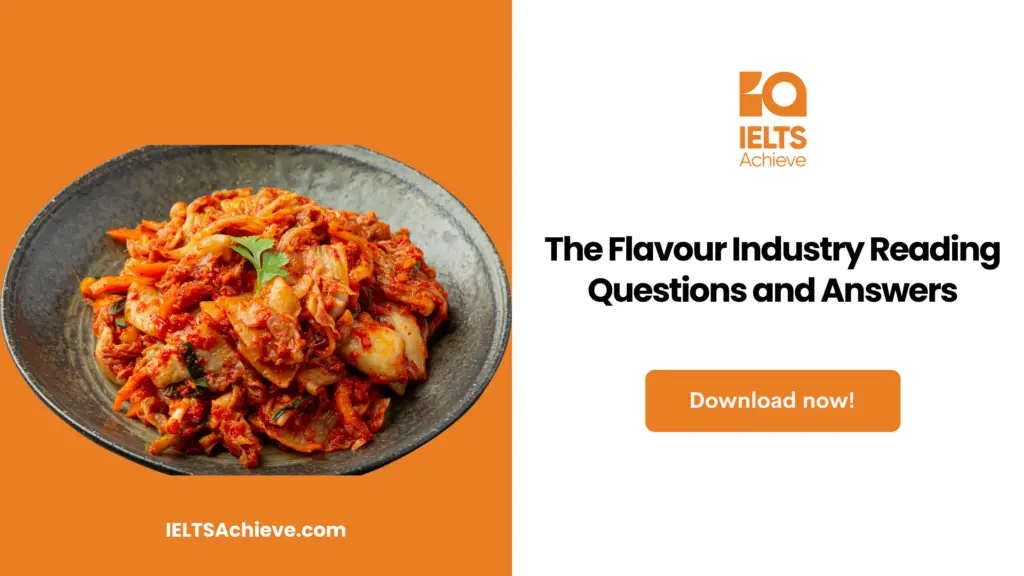The Blog post contains the following IELTS Reading Questions:
- IELTS Reading Locating information
- IELTS Reading Multiple Choice Questions
- IELTS Reading True/False/Not Given
Stay informed and prepared for success – Explore our comprehensive Reading Test Info page to get valuable insights, exam format details, and expert tips for mastering the IELTS Reading section.
IELTS Reading Passage: The flavour industry

The flavour industry
A. Check the nutritional details on the food in your cooler, icebox or serving pantry, and you are likely to find a simple, harmless-looking component frequently on a number of products: “ natural flavour”. The tale of what natural flavor is, how it got into your food, and where it came from is the outcome of a more complicated procedure than you might visualize.
B. During the 1980s,health observers and nutritionists turned their awareness to cholesterol, a waxen corticosteroids metabolite that we mostly eat from animal-sourced commodities like egg yolks, shrimp, poultry, cheese and pork. Nutritionists blamed cholesterol for putting up with the growing rates of fatness, heart disease, diabetes, and several cancers in western culture. As broad identification of the matter flourished amongst the general people, McDonald’s came to an end for cooking their French fries in a blend of cottonseed oil and rendered suet, and in 1990, the restaurant chain began using 100% vegetable oil as an alternative.
C.This considerably let down the amount of cholesterol in McDonald’s fries, but it generated a new dilemma. The rendered suet and cottonseed oil blend gave the French fries high cholesterol content, but it also presented them with a rich aroma and texture that even James Beard, an American food critic, acknowledged he enjoyed. Pure vegetable oil is dull in contrast. Looking at the current component list of McDonald’s French fries, but, it is easy to see how they conquered this difficult situation. Apart from a few conservative, there are basically three main components: soybean oil, potato, and the puzzling ingredients of “natural flavour”
D. Natural falvour also get into our diet via the rise in junk foods, which now make up over 90% (and increasing) of the American diet, in addition to representing a flourishing industry in developing nations such as China and India junk foods are basically any foods that have been bagged, bottled, boxed or packaged and have a list of components on the label. Occasionally, the refining requires adding a little salt and sugar, and few conservatives.frequently, but it is colored, bleached, combined, dried, smell-hidded, and sweetened. This procedure usually saps any original flavour out of the output, and so, naturally, flavour must reappear in as well.
E. Frequently this is “natural flavour”, but while the term may bring to mind resemblance of fresh corn, hand-ground spices, and dried herbs being marketed in a busy street market, nearly all of these natural sources are, actually, manipulated to comestible perfection in a set of factories and plants of the New Jersey Turnpike outside of New York. Here, firms such as International Flavours and Fragrances, Harmen and Keimer, Flavour Dynamics, Frutarom and Elan Chemical separate and make the tastes that are incorporated in much of what we eat and drink. The sweet hot rupture of naturally crushed orange juice, the wood -smoked aroma in barbeque sauces, and the creamy, buttery, fresh taste in many dairy products do not come from sun-saturate fields or backyard grills but are formed in the labs and test tubes of these flavour industry giants.
F. The chemist- titled “flavourists” who generate the powerful chemicals that set our aromatic sense to overuse a blend of methods that have been purified over many years. Parts of it are thick, complex chemistry: spectrometers, gas chromatographs, and headspace-vapor analyzers can classify ingredients of a flavor in amounts as minute as one part per billion. Not to be excelled, but, the human nose can set apart aromas down to three parts per trillion. Flavourists, consequently, think about their work as much an art as a science, and flavourism needs a nose “ instructed” with a fine and inverse sense of balance.
G. Should we be cautious of the mechanization of natural flavour? On its own, the trend may not give any clear cause for fear. Nutritionsts universally concur that the real hit on health in the last few decades stalk from an “demonic trinity” of sugar, fat, and salt in junk foods, the natural flavour on its own is not a health exposure. It does play a role, but, in serving these junk foods to taste fresh and nutritious even when they are not. So, while the natural flavour industry should not think about the offender, we might think of it as a ready abetter.
Unlock your full potential in the IELTS Reading section – Visit our IELTS Reading Practice Question Answer page now!
Recommended Questions:
Renewable Energy IELTS Reading Question with Answer
IELTS Reading Questions: the flavour industry reading answers
Questions 1-8
- Reading Passage has seven paragraphs, A-G.
- Which paragraph contains the following information?
- Write the correct letter. A-G, in boxes 1-8 on your answer sheet.
- NB You may use any letter more than once.
1 Examples of companies that create natural flavors
2 An instance of a multinational franchise responding to public pressure
3 A statement on the health effects of natural flavors
4 An instance where a solution turns into a problem
5 A place in the home where one may encounter the term “natural flavor”
6 Details about the transformation that takes place in processed grocery items
7 A comparison of personal and technological abilities in flavor detection
8 Examples of diet-related health conditions
Questions 9-12
- Do the following statements agree with the information given in the Reading Passage?
- In boxes 9-12 on your answer sheet, write
- TRUE, if the statement agrees with the information
- FALSE, if the statement contradicts with the information
- NOT GIVEN, if there is no information on this
9 On their own, vegetable oils do not have a strong flavor.
10 Soybean oil is lower in cholesterol than cottonseed oil.
11 Processed foods are becoming more popular in some Asian countries.
12 All food processing involves the use of natural flavors.
Enhance your skills in identifying information as True, False, or Not Given. Click here to discover expert strategies and techniques for mastering this question type in the IELTS Reading section.
Question 13
Choose the correct letter. A B, C, or D and write it on your answer sheet.
13. The writer of Reading Passage concludes that natural flavors…………………..
A are the major cause of dietary health problems.
B are unhealthy, but not as hard as sugar, fat, and sodium.
C has health benefits that other ingredients tend to cancel out.
D helps make unhealthy foods taste better.
Ready to improve your performance in Multiple Choice Questions (MCQs)? Click here to access our comprehensive guide on how to tackle MCQs effectively in the IELTS Reading section.
Unlock your full potential in the IELTS Reading section – Visit our IELTS Reading Practice Question Answer page now!
Recommended Questions:
Renewable Energy IELTS Reading Question with Answer
The flavour industry Reading Answers
1.E
2.B
3.G
4.C
5.A
6.D
7.F
8.B
9.True
10.Not Given
11.True
12.True
13.D

We hope you found this post useful in helping you to study for the IELTS Test. If you have any questions please let us know in the comments below or on the Facebook page.
The best way to keep up to date with posts like this is to like us on Facebook, then follow us on Instagram and Pinterest. If you need help preparing for the IELTS Test, join the IELTS Achieve Academy and see how we can assist you to achieve your desired band score. We offer an essay correction service, mock exams and online courses.

